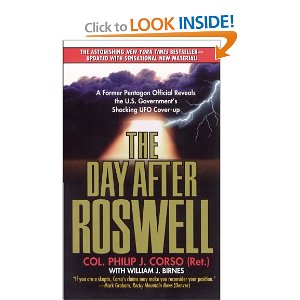
Philip Corso
4.0 out of 5 stars Glimpse into government's handling of UFO resources April 11, 2006
Before I begin my review, let me clarify that I have only a moderate curiosity in UFO's and such. I'm not a skeptic or a believer, but someone who sees a field of study that's intriguing, impossible to flat-out dismiss, and at the very least entertaining. Nevertheless I did pick up this book and read it. Here are my thoughts:
Many skeptics ask, “If the government DOES know something about aliens and UFOs, why, and how, do they keep it secret from everyone else?”
Col. Corso's book gives a sober and convincing explanation for this. Rather than giving a broad overview, however, he wisely sticks to a specific description of his own hands-on experience and how he did the job he was asked to do. Specifically, as head of the Army's Foreign Technology Desk in the Pentagon, Corso alleges he was in charge of “getting something useful” out of alien artifacts collected from the Roswell UFO crash in 1947.
Corso was faced with a challenge: How do you gather funding and personnel (many of whom are low-ranking) for a US Army R&D project on the Roswell UFO artifacts, while using “normal,” visible administrative channels, and keep it a secret from other branches of the government and even many of the individuals directly involved?
In describing how he faced that challenge, Corso gives a thorough account of not only the alien technology he says was discovered at Roswell, but the bureaucratic processes involved in researching it and putting it to use. He describes how artifacts from Roswell gave earthly science a jumpstart on the integrated circuit chip, the laser, and a host of other technologies, and how these technologies were “seeded” outside the military to eventually better life for the public.
If you're looking for a lot of descriptive, speculative narrative about Roswell and aliens in general, you'll find little of it here. Corso sticks to describing his singular, albeit tremendously important, role in how the government handled the discovery at Roswell, and he does it with a minimum of hocus-pocus.
Then again that's probably the most valuable thing about this book: it lets the nitty-gritty, sometimes boring details of how the government really functions supercede the sensational. It gives a solid description of HOW so much could be going on and kept secret within the government.
In writing this book Corso only opens himself up to ridicule, and risks tarnishing his entire career in the military. I can't see why a sane person would do this just to make a few bucks, and from his writing Corso seems like a very level-headed, objective person. Judge for yourself, but in my opinion this book seems very truthful and credible.




